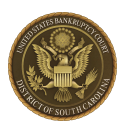David R. Duncan shall begin his service as a United States Bankruptcy Judge for this District upon the administration of oath in a private ceremony on Friday, May 26, 2006. He will have a public investiture ceremony on the afternoon of July 12, 2006. Judge Burris and I are pleased to welcome David as a colleague to the bench.
You are here
Chambers' Bulletins
05/2006
The Judges of the United States Bankruptcy Court for the District of South Carolina are now accepting applications from interested parties for the position of Clerk of Court. The position announcement is posted on the Web Page and any confidential questions may be directed to the Judges or the Court’s Human Resource Administrator.
The Judges will be assisted in the interview selection process by the Court’s Advisory Committees of practitioners and employees. Those experienced in the private practice of bankruptcy law and who otherwise meet the qualification requirements are encouraged to apply.
Brown Bag Lunch with the Judges
Judge Burris, David Duncan and I would like to invite members of the consumer practice bar to share their experiences under the Reform Act during a “brown bag” lunch at 12:30 p.m. Thursday, May 18, 2006, at the Bankruptcy Courthouse in Columbia. Attendance is limited to attorneys in consumer practice (both debtor and creditor). Since space is also limited, please indicate your interest in attending by e-mail to Cheryl at Cheryl_Hughes@scb.uscourts.gov no later than Tuesday, May 16, 2006 at 2:00 p.m. Attendance will be on a first come basis and you will be notified of further details.
Recent Statistics
A recent survey by the American Bankruptcy Institute indicates that our District has the lowest percentage consumer bankruptcy filings in the United States. The survey indicates that last year South Carolina averaged 1 consumer bankruptcy filing for every 123.16 households. The national average for 2005 was 1 filing for every 60 households. Nationally, bankruptcy filings are down an average of 73% from 2005. Bankruptcy filings in this District are down this year by 64% compared to the previous year. Pro se filings have averaged 3% year to date. Despite the reduction in filings, the Court continues to maintain a full docket as it considers many of the issues raised by the Bankruptcy Abuse Prevention and Consumer Protection Act of 2005. The Court posts its recent opinions on the Reform Act issues on its web page.
Charleston Division
I would like to express my appreciation to the consumer lawyers practicing in the Charleston division for their adjustment to new hearing procedures in Chapter 13 cases. Hopefully, these procedures have improved efficiencies, allowed more time for contested matters, and eliminated wait time for parties and counsel. The bar’s quick adjustment and acceptance has been of great assistance to me in this busy time.
I recently attended a Federal Judicial Center conference in New York attended by the majority of the Bankruptcy Judges in the country. As would be expected, much of the discussion was on issues arising under the Reform Act of 2005.
It is fair to say that our district’s procedures and rulings to date fall within the majority of opinions or main stream. To date, the Court has issued several decisions governed by the Reform Act and each decision is available on the Court’s web site:
1. In re Dansby, C/A No. 05-45490-W (Bankr. D.S.C. Feb. 10, 2006) (determining under what circumstances a debtor may qualify for a waiver of pre-petition credit counseling).
2. In re Turner, C/A No. 05-45355-W (Bankr. D.S.C. Mar. 31, 2006) (sustaining an objection to a plan that proposed to bifurcate the claim of a creditor secured by a purchase money interest in a vehicle contrary to §1325(a)(5)).
3. In re Cushman, C/A No. 05-44954-W (Bankr. D.S.C. Apr. 6, 2006) (holding that the applicable commitment period for a chapter 13 plan is five years if the debtor is above median income, is paying less than 100% to unsecured creditors, and there is an objection under § 1325(b)).
4. In re Capers, C/A No. 06-80042-W (Bankr. D.S.C. Apr. 12, 2006) (interpreting § 1328(f) to prohibit a debtor from receiving a discharge because debtor converted her previous chapter 13 case to a chapter 7, received a chapter 7 discharge, and filed her current chapter 13 case within four years of the previous case).
5. In re Drahnak, C/A No. 06-80044-W (Bankr. D.S.C. Apr. 11, 2006) (holding that the application of § 1328(f) is not unconstitutional).
6. In re Ratzlaff, C/A No. 06-80048-W (Bankr. D.S.C. Apr. 24, 2006) (discharge prohibition period of § 1328(f) is determined by the petition date of a debtor’s current chapter 13 verses the debtor’s petition date of their previous case in which they received a discharge).
7. In re Brown, C/A No. 06-00197-W (Bankr. D.S.C. Apr. 24, 2006) (holding on a motion to redeem that the replacement value of the property acquired for personal, family or household use determines the value of the property).
The Court has also issued numerous opinions on the application of § 362(c)(3) in chapter 13 cases.
Prominent issues not yet ruled on in this District include the following:
1. whether a chapter 13 plan can be confirmed without the automatic stay;
2. does the failure to extend the stay effect all creditors or just those with pending judicial actions;
3. may the Court confirm a plan if the plan is contrary to § 1325(a)(5) and the effected creditor does not object;
4. is a hearing or evidence required prior to the entry of an order confirming the termination of the automatic stay;
5. what is the required dividend to unsecured creditors in a chapter 13 if an objection is raised under § 1325(b);
We are placing orders, which address issues arising under the Reform Act, immediately on the opinions section of the web page.
